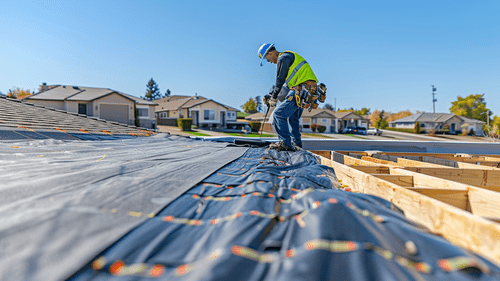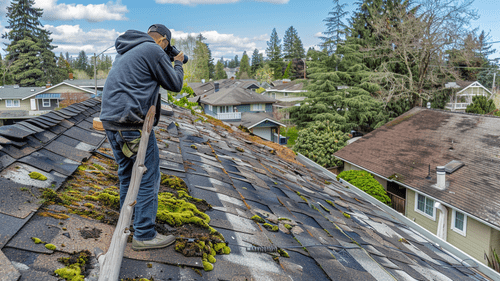Are you on the hunt for a reliable roofing contractor in Texas? With so many options out there, it can feel like you’re trying to find a needle in a haystack. But don’t worry, we’ve got your back! In this ultimate guide, we’ll walk you through the process step-by-step so you can make an informed decision and protect your investment. From referrals and credentials to experience and red flags, we’ll cover everything you need to know to choose the perfect roofing contractor for your project. So, let’s dive in and get you one step closer to the roof of your dreams!
Finding Potential Roofing Contractors: Where to Start
When it comes to finding potential roofing contractors in Texas, your best bet is to start by asking for referrals from people you trust. Talk to your friends, family, and neighbors who have recently had roofing work done. They can give you the inside scoop on their experiences with different contractors, which can be incredibly valuable in your search.
Another great resource is your local Chamber of Commerce and trade associations. These organizations often have lists of reputable roofing companies in your area, so you can start your search with a solid foundation.
Once you have a list of potential contractors, it’s time to do some digging. Research each company thoroughly, paying attention to their experience, reputation, and the services they offer. The Better Business Bureau is a great place to check for any complaints or red flags.
But don’t just focus on the technical aspects – the attitude and professionalism of the company representatives during meetings are just as important. Are they friendly and courteous? Do they take the time to answer your questions and make you feel valued as a customer? Remember, you’ll be working closely with this contractor, so it’s important to find someone you feel comfortable with.
By following these steps, you’ll be well on your way to finding a roofing contractor who not only has the skills and experience to get the job done right, but also values your business and treats you with respect.
Verifying Your Contractor’s Credentials: What to Look For
Before you sign on the dotted line with a roofing contractor in Texas, it’s crucial that you verify their credentials. This will give you peace of mind and ensure that you’re getting quality workmanship from a professional who knows what they’re doing.
First and foremost, check if the contractor is an RCAT Licensed Roofing Contractor. This certification is a stamp of approval from the Roofing Contractors Association of Texas, and it guarantees that the contractor meets high standards of professionalism and reliability. You can easily verify this on the RCAT website or by contacting them directly.
Next, make sure the contractor has a legitimate business address and adequate insurance coverage. This protects you from any potential liabilities and shows that the contractor is a serious business owner who stands behind their work.
It’s also important to verify that the contractor has passed the necessary licensing exams in Texas. These exams test the contractor’s knowledge of safety regulations and the latest roofing techniques so you can be confident that they have the skills and expertise to handle your project.
Finally, look for any endorsements from reputable organizations within the roofing industry. These endorsements are a sign that the contractor has a track record of delivering high-quality work and satisfied customers.
By taking the time to verify your contractor’s credentials, you can rest easy knowing that you’ve chosen a professional who is qualified, experienced, and committed to excellence.
Evaluating Your Contractor’s Experience: What to Consider
When it comes to choosing a roofing contractor in Texas, experience is key. You want to work with someone who has a proven track record of success and can handle any challenges that may arise during your project.
Start by looking at how long the contractor has been in business. A company that has been around for many years is likely to have a wealth of experience and a solid reputation in the community. They’ve seen it all and know how to handle any situation that may come up.
Next, consider the types of roofing projects the contractor has worked on in the past. Have they tackled a wide range of materials and styles? Do they have experience with the specific type of roof you have? The more diverse their portfolio, the better equipped they’ll be to handle your project with skill and expertise.
Don’t forget to think about the unique challenges that come with roofing in Texas. Our state is known for its extreme weather conditions, from scorching heat to severe storms. An experienced contractor will know how to navigate these challenges and ensure that your roof is built to withstand whatever Mother Nature throws its way.
By taking the time to evaluate your contractor’s experience, you can have confidence that you’re working with a true professional who has the knowledge, skills, and expertise to deliver exceptional results.
Red Flags to Watch Out For: Protecting Yourself from Roofing Scams
While there are many reputable roofing contractors out there, unfortunately, there are also some bad apples who are looking to take advantage of unsuspecting homeowners. That’s why it’s so important to be aware of the red flags that can indicate a potential scam.
One of the biggest red flags to watch out for is a contractor who asks for a large deposit or full payment upfront. This is not standard practice in the roofing industry, and it’s a major warning sign that the contractor may not be legitimate. If they’re asking for money before any work has been done, it’s best to walk away.
Another red flag is high-pressure sales tactics. A reputable contractor will never try to rush you into signing a contract or making a decision on the spot. They’ll take the time to answer your questions, provide detailed estimates, and give you the space you need to make an informed decision.
If a contractor’s estimate seems too good to be true, it probably is. While it may be tempting to go with the lowest bidder, remember that you get what you pay for. A significantly lower estimate could be a sign that the contractor is cutting corners or using subpar materials.
Finally, be wary of contractors who don’t have a verifiable business address or local references. A legitimate contractor will have a physical office and a list of satisfied customers who can vouch for their work. If a contractor is hesitant to provide this information, it’s a sign that they may not be as established or reliable as they claim to be.
By looking for these red flags, you can protect yourself from potential scams and ensure that you’re working with a trustworthy contractor.
Signing on the Dotted Line: What to Include in Your Roofing Contract
Congratulations, you’ve found the perfect roofing contractor for your project! Now, it’s time to make it official by signing a contract. But before you put pen to paper, it’s important to make sure that your contract includes all the necessary details to protect your investment.
First and foremost, your contract should clearly outline the scope of work to be performed, including the materials to be used, the estimated timeline for completion, and any warranties or guarantees offered by the contractor. Make sure that everything you’ve discussed is put in writing so there’s no confusion down the line.
Payment terms are another critical component of your contract. Be sure to understand when payments are due and what percentage of the total cost is required at each stage of the project. Look for contracts that include a lien waiver upon final payment, which protects you in case the contractor fails to pay their suppliers or subcontractors.
Speaking of protection, don’t forget to ask about workmanship and product warranties. These warranties give you added peace of mind and ensure that you’re covered in case of any defects or issues that may arise after the project is complete.
Finally, make sure your contract includes details about project inspections and the right to rescind. You should have the opportunity to inspect the work at various stages of the project and the right to cancel the contract within a certain timeframe if you’re not satisfied with the work.
By including all of these essential elements in your roofing contract, you can rest easy knowing that your investment is protected and that you and your contractor are on the same page about every aspect of your project.
Wrapping Up: Your Roadmap to Roofing Success
Choosing the right roofing contractor in Texas may seem daunting, but by following the steps outlined in this ultimate guide, you can navigate the process with confidence and ease.
Start by gathering referrals from trusted sources and researching potential contractors. Verify their credentials, evaluate their experience, and look for any red flags that may indicate a scam.
Once you’ve found the perfect contractor for your project, make sure your contract includes all the necessary details to protect your investment, from the scope of work and payment terms to warranties and the right to rescind.
By taking the time to vet your contractor and carefully review your contract thoroughly, you can ensure that your roofing project is a success from start to finish. And remember, while price is certainly a factor to consider, it’s not the only one. Focus on finding a contractor who combines quality, expertise, and professionalism, and you’ll be well on your way to the roof of your dreams.
So what are you waiting for? Use this guide as your roadmap to roofing success and take the first step towards a roof that will protect your home and family for years to come. Happy roofing!







